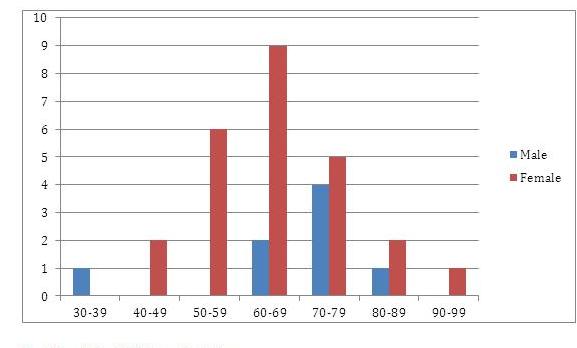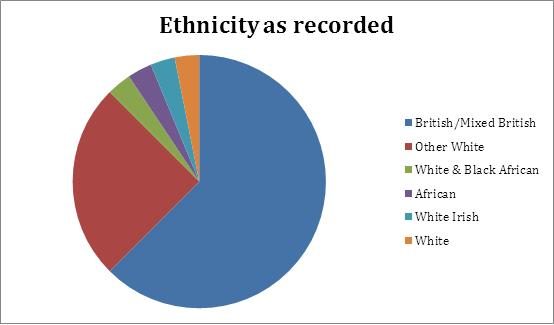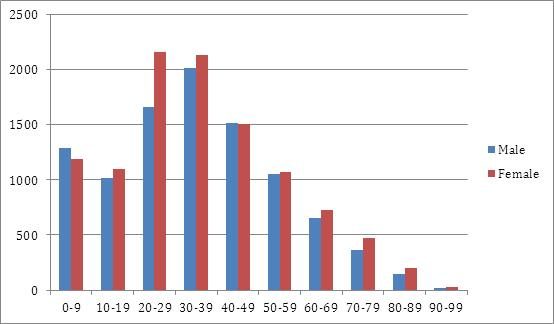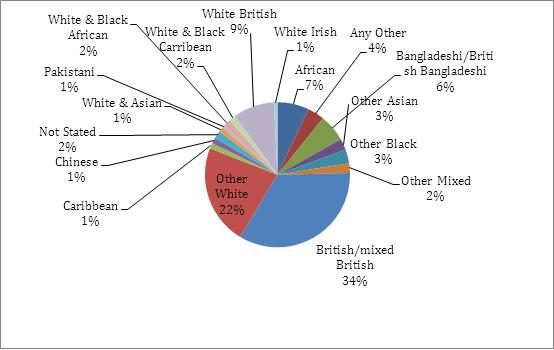The PPG currently consists of 34 active patient members of the practice plus at least 2 practice members which includes one of the partners and the Deputy Practice Manager.
Profile of the PPG by age and sex:
| 10-19 | 20-29 | 30-39 | 40-49 | 50-59 | 60-69 | 70-79 | 80-89 | 90-99 | |
| Male | 0 | 0 | 1 | 0 | 0 | 2 | 4 | 1 | 0 |
| Female | 0 | 0 | 0 | 2 | 6 | 9 | 5 | 2 | 1 |

Profile of the PPG by ethnicicty:

Profile of registered patients by age and sex:
| 0-9 | 10-19 | 20-29 | 30-39 | 40-49 | 50-59 | 60-69 | 70-79 | 80-89 | 90-99 | 100+ | |
| Male | 1287 | 1017 | 1661 | 2017 | 1513 | 1058 | 651 | 360 | 148 | 16 | 0 |
| Female | 1191 | 1097 | 2162 | 2136 | 1511 | 1070 | 731 | 469 | 197 | 30 | 1 |

Profile of registered patients by recorded ethnicity:

The PPG and the practice acknowledge the difficulty in try to ensure that such a large and diverse population as seen at the James Wigg Practice has representation and a consensus was agreed that, while it may be difficult to ensure that there is an active PPG member from each demographic, that increased effort should be made in making the PPG as accessible as possible and these initial efforts are described later in this report.
In May 2013 the PPG discussed areas of concern and decided to conduct a patient survey to assess opinion on the external services that patients were referred to such as physiotherapy, podiatry etc.
The surveys were distributed to doctors to hand to patients at the point of contact and also left in the waiting room for patients to complete.
Despite over 60 forms being distributed only 3 were returned, one commented on the difficulty obtaining an appointment, one indicated that the physiotherapy service had been good and the other on the advantage of having a phlebotomy service in the practice.
Feedback from clinicians felt that there may have been a delay between the referral to the service and the appointment possibly leading to the patient forgetting about the survey and lack of time to explain the form during the consultation and also the fact that the survey was carried out over the summer when many of the usual clinicians were on leave. Overall it was felt to be a very disappointing response.
The issue around appointments was discussed in detail at the PPG meeting in July as this had been the subject of a number of administrative complaints received by the practice. Key action points were identified as follows:
1) Lack of information regarding the new appointment system
2) To consistently be able to book appointments at least 4 weeks in advance
3)Address concerns about the apparent reduced availability of on-the-day appointments.
The practice responded by acknowledging that there had been a problem with the introduction of a new appointment system and that some of the key issues were around lack of information available for patients and has subsequently produced an information leaflet for patients which is readily available at the reception desk and also around training for reception staff – this has resulted in any ongoing training programme for reception staff.The practice acknowledges that while some of the problem had been due to the reorganisation of Health Education England and a delay in information regarding staff on the Foundation year programme being given to practices in a timely fashion, there was also a local problem around staff requesting leave once the rota had been finalised which caused unacceptable delays. The practice has now a strict policy of a minimum of 6 weeks’ notice for leave.The practice also agreed to address concerns about the availability of on-the-day appointments.Further research done within the practice showed peak demands for these appointments on Mondays and the appointment system has been adjusted further to accommodate this demand.Core opening hours of the practice are 8.30am – 6.30pm Monday-Friday with extended hours appointments being available from 7.30-8.00am on Monday, Wednesday and Thursday mornings and from 6.30-8.00pm on Tuesday and Thursday evenings. During core hours patients can access services either by presenting to the reception desk, telephoning or, for non-urgent requests sending an e-mail to the practice e-mail address which is [email protected] further concern, throughout the year attendance at the PPG had been falling and in Autumn the practice took the decision to suspend the PPG in order to look at ways of improving representation and direction.This resulted in several positive outcomes.The existing members of the PPG met independently of the practice and identified the following key areas for the PPG to act on:
1) Terms of reference for the PPG
2) Appointing a patient chair to run the meetings
3) A subgroup to look at increasing representation on the PPG
4) A subgroup to look at setting up a “virtual” PPG in order to improve communication between meetings and improve the profile of the PPG within the practice.
This was fed back to the practice in January 2014 and to date the terms of reference have been agreed and the members of the subgroup have been appointed.The practice and the PPG are continuing to work to ensure that as many patients as possible can access the PPG and that the PPG can continue to work with the practice in what has historically been a very positive and productive way.A cancer support group with the aim of providing a network of support for patients and carers who have been affected by a diagnosis of cancer has also been set up by some members of the PPG and the inaugural meeting took place recently and was extremely well attended and received. The idea for this came from members of the PPG and has been resourced and developed purely by them with some administrative support from the practice in order to publicise the group.
This report was discussed at the most recent PPG meeting held on 20th March 2014.

